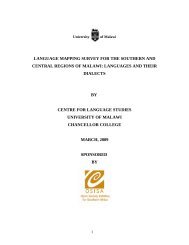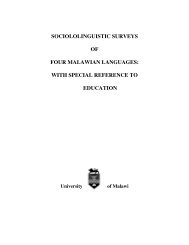languages and area spoken for chitipa - Centre for Language Studies
languages and area spoken for chitipa - Centre for Language Studies
languages and area spoken for chitipa - Centre for Language Studies
You also want an ePaper? Increase the reach of your titles
YUMPU automatically turns print PDFs into web optimized ePapers that Google loves.
1.8 Challenges<br />
Immobility of many people living in remote rural <strong>area</strong>s was a major challenge in the<br />
administration of the individual questionnaires. Some of the responses we got were<br />
contradictory, a sign that they did not know much even about <strong>languages</strong> in their own<br />
traditional authority due to the fact they do not travel to other <strong>area</strong>s within their<br />
traditional authority. Focused group discussions <strong>and</strong> key in<strong>for</strong>mants proved to be more<br />
in<strong>for</strong>mative because people were engaged in intense debate be<strong>for</strong>e coming to a consensus<br />
on the responses they gave <strong>and</strong> also because selection of the key in<strong>for</strong>mants was based on<br />
the knowledge of the <strong>area</strong>s under study <strong>and</strong> most of the people interviewed showed to be<br />
more conversant <strong>and</strong> familiar with the language situation in their own T/A as well as in<br />
other T/As. A decision was there<strong>for</strong>e made a few days into the study that during the<br />
focused group discussions clarifications should be sought <strong>for</strong> contradictory responses got<br />
during the individual respondent questionnaires. Although the focused group discussions<br />
attracted a lot of debate among participants, they were however, able to arrive at a<br />
consensus on the issues discussed.<br />
As pointed out above, the target number of participants <strong>for</strong> the focused group discussions<br />
was 20. This number was manageable <strong>and</strong> easy to control. However, in some cases, the<br />
village heads were hesitant to identify the suitable participants <strong>for</strong> fear of ill feelings from<br />
other villagers who would be left out from the discussions. In other <strong>area</strong>s, it was difficult<br />
to control the numbers <strong>and</strong> people came in large numbers thinking that the research team<br />
would distribute rewards at end of the discussions. Such an attitude, we later learnt, is<br />
growing among interviewees in the villages because some research organizations give<br />
tokens to people after the interviews.<br />
In some <strong>area</strong>s, respondents were not interested to be interviewed because they claimed<br />
they do not get feed back from researchers. Our research team did not promise to come<br />
back to the people with results of the survey but rather send findings of the survey to<br />
district commissioners offices in all the districts visited so that it is shared with TAs<br />
during district development committee meetings who in turn would share with the village<br />
heads because they were aware of the villages that research team visited during the<br />
11





